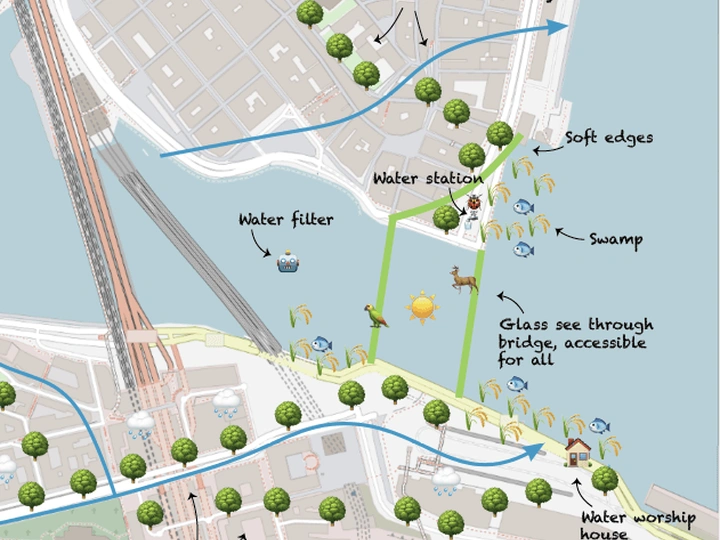A Voice of Water

My name is Melissa van Gerwen, a Dutch spatial planner based in Copenhagen, Denmark. I have an academic background in interdisciplinary social sciences and spatial planning, and professional experience working with various Dutch government bodies. Over the years, I have specialized in leading complex, cross-sectoral initiatives that address urgent climate challenges and promote sustainable development.
My approach is rooted in clear communication, strategic thinking, and hands-on leadership. I focus on collaborative problem-solving, bringing together diverse stakeholders to co-create practical solutions and translate ambitious visions into tangible results. I am especially drawn to alternative forms of co-creation and community engagement, always looking for ways to enhance the social and ecological impact of my work.
A central theme in my practice is giving voice to stakeholders who are often unheard—particularly non-human actors such as water. This is reflected in my project A Voice of Water, which was awarded the runner-up prize in the Sustainable Design Competition and exhibited for a month in Stockholm’s central square. I later presented this work during a guest lecture at KTH University.
In another project commissioned by the Municipality of Amsterdam, I designed and led an urban water walk to raise awareness of water’s role in the urban landscape. This initiative emphasized community engagement in climate resilience and was awarded the municipality’s Sustainability Prize, recognizing its contribution to fostering public environmental awareness.
Humankind has an undeniable connection with nature, we are dependent on it as a source of life and we should consider ourselves being a part of nature. This is not perceived as such in planning where humans are seen as the dominant species that have the authority to decide what happens to an area independent of what others need. But should we not consider the wishes and needs of others before our own, since they are our source of life? Is it not essential to value others with an intrinsic value independent of their added value to the wellbeing of humankind, which is more similar to indigenous cultures? I believe so.
The current communicative planning paradigm appears to lack the ability to include the voices of the voiceless and is stuck in practices that continue to confirm the status-quo through technocratic quick fixes, which do not solve underlying problems causing climate change. This work is an exploration of how two unconventional methods, storytelling and co-created speculative design, can contribute to a change in paradigm, specifically improve the inclusiveness of coproduction, where nonhumans are involved in the decision-making processes.
One way of reimagining the future is by including actants (beings and non-beings that have the possibility to impact each other) that have not been heard before through the act of representation. By including an alternative perspective into the planning process, more innovative and sustainable solutions could arise.
In my work, I would like to take the reader on a journey through the embodiment of water. Through this journey an alternative perspective is attempted to be shared with the participants, readers and an increasing openness towards ecocentrism, where all organisms on the planet have an intrinsic value irrespective of humans, is created. It can be questioned to what extent representation truly gives a voice to the voiceless, however we have to try and work towards creating a truly inclusive society.